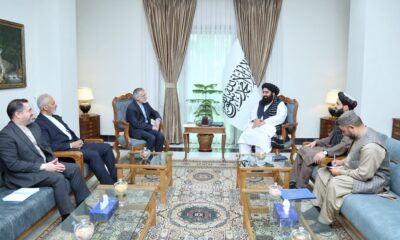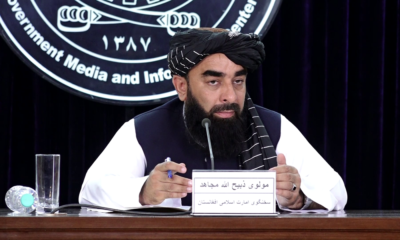Business
Uzbek envoy to Pakistan discusses Trans-Afghan Railway project with Pakistani minister
The Trans-Afghan Railway project is expected to serve as a powerful stimulus for trade and economic integration among numerous countries in the region
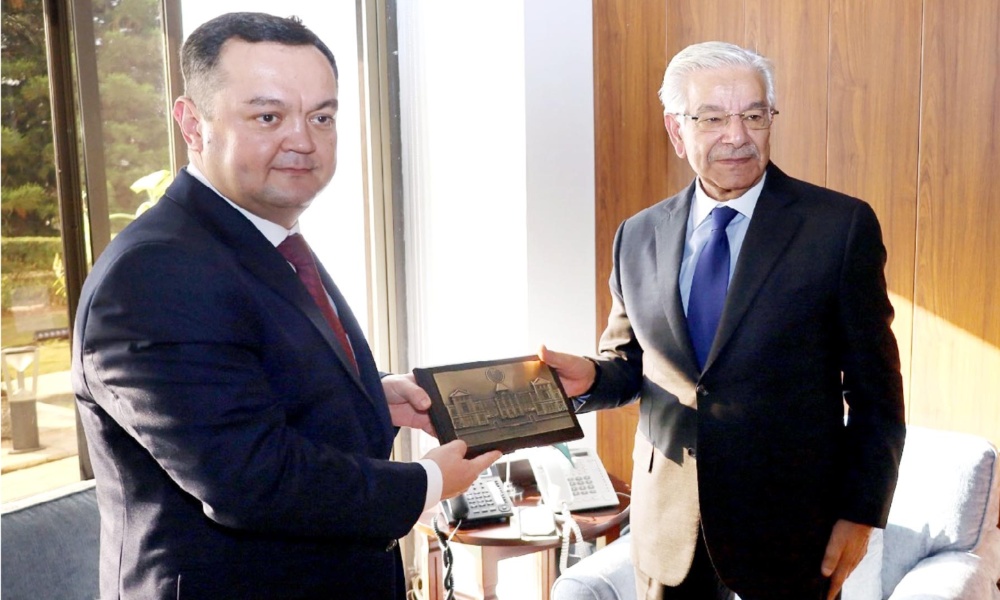
Regional connectivity projects including the Termez-Kabul railway line, the Trans-Afghan Railway, and the multimodal Belarus-Russia-Kazakhstan-Uzbekistan-Afghanistan-Pakistan transport corridor, are key to the region’s success, the Ambassador of Uzbekistan to Pakistan Alisher Tukhtayev said during a meeting with Pakistan’s Defense Minister Khawaja Asif on Friday.
The two officials discussed a range of issues as well as coordinating efforts to ensure stability and deepen economic integration in the region.
Asif however pointed out that Tashkent has become an important hub for regional cooperation, Pakistani media reported Monday.
Special focus was given to the implementation of the Trans-Afghan Railway project, which is expected to serve as a powerful stimulus for trade-economic integration to numerous countries.
The ambassador said the governments of Uzbekistan, Pakistan, and Afghanistan are actively cooperating in the implementation of joint economic and infrastructure projects and one of them is the construction of the Trans-Afghan Railway.
He said the “Termez-Kabul-Peshawar” railway project plays an important role in restoring ties of regional connectivity between Central and South Asia.
He added that once the project is launched, the volume of trade will increase significantly and shipping costs will decrease.
Tukhtayev said the railway connectivity will contribute hugely to regional stability and overall prosperity by aiding Afghanistan’s economic recovery.
He also said the project will facilitate the delivery of Uzbek goods to world markets through Pakistani ports and will open up a new route for Pakistan to export its products to Central Asian, and European markets.
According to him, the Trans-Afghan railway will be able to carry up to 20 million tons of cargo per year, and transportation costs will decrease by 30-35% and timing of deliveries will be cut from two weeks to three to four days.
He also stated that the international cooperation project on the development of the multimodal transport corridor Belarus-Russia-Kazakhstan-Uzbekistan-Afghanistan–Pakistan is being actively promoted.
Business
Trump imposes 10% tariff on imports from Afghanistan
The tariffs, he said, were a response. The base tariff of 10 percent on almost all US imports will be imposed by April 5, the additional reciprocal tariffs on countries will kick in on April 9.

President Donald Trump on Wednesday announced a range of tariffs targeting almost all countries that the United States trades with including Afghanistan.
Trump announced the tariffs in an executive order alongside an address in the Rose Garden at the White House on Wednesday.
In the executive order, Trump said while the US trading policy has been built on the principle of reciprocity, taxes and barriers on US products by its trading partners had hurt the US.
The tariffs, he said, were a response. The base tariff of 10 percent on almost all US imports will be imposed by April 5, the additional reciprocal tariffs on countries will kick in on April 9.
During his address, Trump made the argument that the US is charging its trading partners with smaller tariffs compared with the tariffs and non-tariff barriers that the partners impose on the US.
“For decades, our country has been looted, pillaged, raped and plundered by nations near and far, both friend and foe alike,” Trump said.
“If you want your tariff rate to be zero, then you build your product right here in America,” he said.
According to information from officials at the Chamber of Commerce and Investment, currently the total volume of trade between Afghanistan and the United States is between $8 and $10 million annually.
Afghan private sector representatives call on the US to reconsider Afghanistan’s inclusion in the tariffs list.
“It will undoubtedly affect us to some extent. Our trade with the US is small, but important items are exported, such as handicrafts, an industry in which women especially work. Handicrafts such as hats are exported. Antique items that are very important to know our identity are also exported. Dried fruits and sometimes fresh fruits and carpets are also exported,” Khan Jan Alokozai, a member of the Chamber of Commerce and Investment, said.
Abdul Qasim Amarkhel, head of the Dried Fruit Exporters’ Union, says: “The 10% tariff is cruel and illegal. This country is not China or Europe, but Afghanistan. Our dried fruit exports to the US are not that high. It is around $10 million. We ask the US to reconsider this decision. It should also release our frozen funds.”
Afghanistan’s exports to the US are mainly carpets and dried fruits.
Business
Exports to Pakistan grind to a halt over faulty scanner at Torkham
Pakistani authorities closed the border to vehicles coming in from Afghanistan after the scanning machine used to track imports developed technical problems.
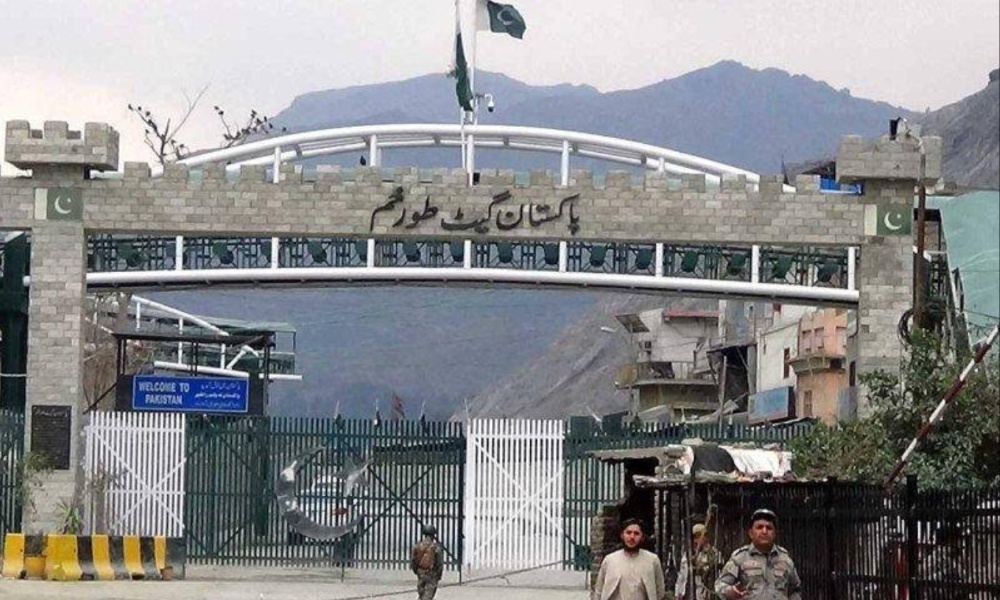
A faulty scanner on the Pakistan side of Torkham border left goods trucks stranded in Afghanistan this week, Pakistani media reported.
Pakistani authorities closed the border to vehicles coming in from Afghanistan after the scanning machine used to track imports developed technical problems.
Importers in Pakistan told Dawn that both the Afghan and Pakistani authorities allowed only empty trucks stranded on the Afghan side to cross into Pakistan.
This comes after the border crossing was closed for a month due to disputes and clashes between border forces. The crossing only reopened late March.
According to border officials, this is the second time that the scanner developed problems since the reopening of the crossing. As a result exports from Afghanistan to Pakistan ground to a halt. Exports included coal, soapstone, fresh produce and dried fruit.
Frustrated traders have called for the scanning system to be replaced with a modern version in order to resolve trade challenges at the border.
Traders also voiced their frustration over customs tariffs at the border. They said the customs terminal operator, National Logistic Cell, charges Rs8,000 for every truck that crosses, whether it is loaded or empty.
Business
Gold climbs to record high as tariff worries bolster safe-haven demand

Gold’s record run extended to another all-time high on Tuesday, buoyed by safe-haven demand as investors brace for U.S. President Donald Trump’s planned announcement on reciprocal tariffs.
Spot gold was up 0.3% at $3,131.56 an ounce at 0914 GMT, after hitting a record high of $3,148.88 earlier, Reuters reported.
U.S. gold futures were 0.3% higher at $3,159.10.
“Trump’s tariff comments and his increasingly volatile stance on Russia’s war against Ukraine are proving the perfect chaos for new record gold prices,” surpassing even the COVID pandemic five years ago, said Adrian Ash, head of research at online marketplace BullionVault.
Trump said on Sunday his reciprocal tariffs to be announced on Wednesday would include all countries, rather than a limited number.
Goldman Sachs on Monday raised the probability of a U.S. recession to 35% from 20% and said it expected more rate cuts by the Federal Reserve, as Trump’s tariffs roil the global economy and upend financial markets.
Gold, traditionally seen as a hedge against uncertainty and inflation, has risen more than 15% this year. Non-yielding bullion also tends to do well in a low interest rate environment.
“The market is watching April 2 closely for further economic indicators that could impact Federal Reserve policy decisions. If rate cuts are confirmed, this would provide additional support for gold’s upward trajectory,” said Alexander Zumpfe, a precious metals trader at Heraeus Metals Germany.
Bullion’s rally this year has also been supported by strong demand from central banks, geopolitical instability in the Middle East and Europe, and increased flows into gold-backed exchange-traded funds.
In the last session, gold closed out its strongest quarter since 1986, and climbed over $3,100/oz, marking one of the most significant upswings in the precious metal’s history.
Investors will also monitor U.S. job openings data later on Tuesday and the U.S. non-farm payrolls report on Friday.
Silver steadied at $34.06 an ounce, platinum fell 0.4% to $988.35, and palladium gained 0.3% to $985.86.
-

 World4 days ago
World4 days agoMyanmar quake death toll hits 1,700 as aid scramble intensifies
-

 Sport5 days ago
Sport5 days agoIPL 2025: Gujarat Titans beat Mumbai Indians by 36 runs
-

 Latest News3 days ago
Latest News3 days agoSwitzerland re-establishes presence in Kabul with humanitarian office
-
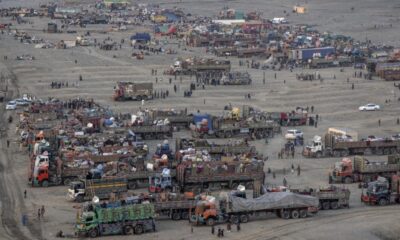
 Latest News3 days ago
Latest News3 days agoPakistan plans to expel 3 million Afghan refugees this year
-

 World4 days ago
World4 days agoSouth Korea, China, Japan seek regional trade amid Trump tariffs
-
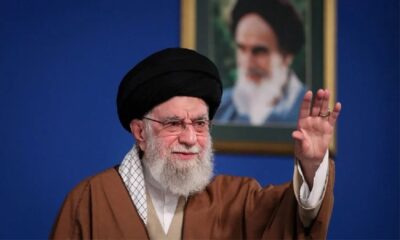
 Regional4 days ago
Regional4 days agoIran’s Khamenei warns of ‘strong’ response if US attacks
-

 Latest News3 days ago
Latest News3 days agoUS won’t rest until all Americans detained in Afghanistan brought home: Rubio
-

 Latest News2 days ago
Latest News2 days agoAfghanistan’s reconstruction is in the interest of EU: Uzbek president



